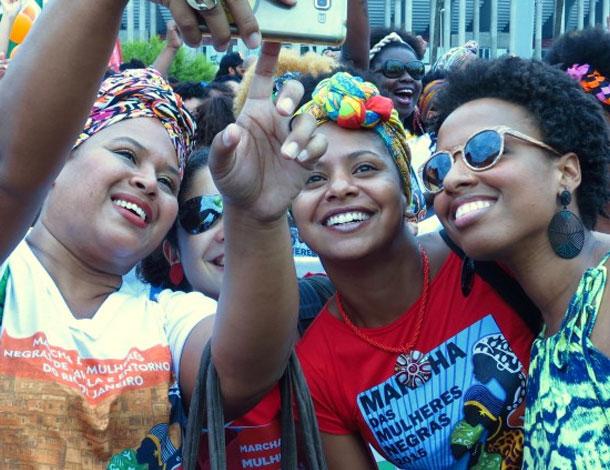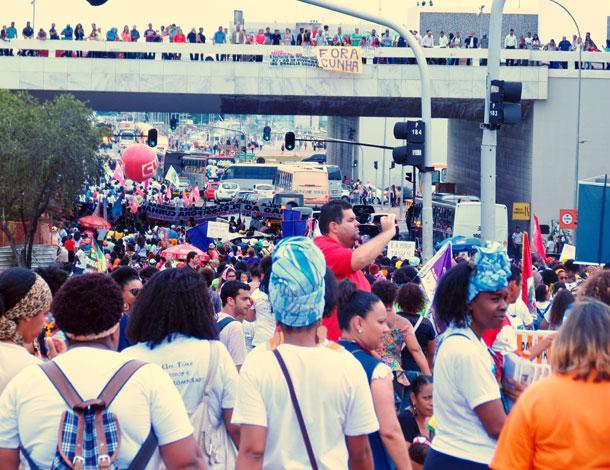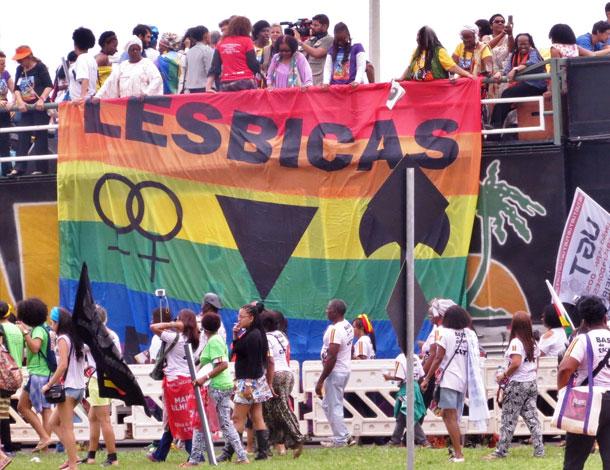Brasilia isn’t like any city I’ve ever been to. Its streets spread out in a clinical grid. In the midday heat, the sun scorches you from above and the overheated asphalt beneath your feet makes walking a pain. There are few trees or hints of foliage to relieve you from the concrete surroundings, interrupted only by strips of crimson soil, as far as the eye can see at street-level.
Feminist, activist-writer and our translator for this trip, Raquel de Souza, calls Brasilia a “failed sociological experiment.”

When I research the city’s history, I learn she’s right. In the 1960s, Brasilia was constructed to be the “ultimate modernist city.” It’s often been criticised for its “antiseptic living blocks …reliance on highways that disassociated people from walkable streets and neighbourhoods, for creating monumental public spaces that served as iconic symbols while alienating visitors, and for over-planning every aspect of urban life so that the city’s inhabitants could not redefine the city on their own terms." (source)
“This city was not built for people to live in and enjoy, it was built to be hostile,” Raquel comments as we plod our way across the central plaza on which Brasilia’s main library and music history museum sit.
We will not be silenced
So there is something exciting and, indeed, radical about the way in which black Brazilian women took over the city entirely on November 18th.
“It was a historic moment. Because this march was the first time that black women from all over Brazil have gathered together at this level, at the national scale. To march led by women because, you know, in the black movements in Brazil, [many of the visible] leaders are black men. So for women to come together like this is a powerful statement.” ~ Raquel de Souza

The moment was symbolically powerful on multiple levels. As thousands of women marched to the National Congress, the seat of formal political power in Brazil, chanting slogans of resistance— “I do not accept my place in the kitchen”, “I want to be in the revolution”—you could not un-see us or un-hear us. We crowded the major highways and byways of the city, forced traffic to a standstill to the point that commuters on their way to work or lunch, in their cars or on the bus or on foot, were obliged to wait while the procession inched by. At one point, you could not see the streets for all the people filling it.
We will take back the narrative…
In 2013, an average of 13 women were killed in Brazil every day according to the 2015 Violence Map: Homicide of Women in Brazil by the Latin American Social Science Institute in coordination with UN Women Brazil and the World Health Organisation. But this violence does not impact all Brazilian women equally. In fact, the number of black or mixed-race women killed between 2003 and 2013 grew by a staggering 54%, the study reveals. Black women account for 49 million, 25% of Brazil’s total population and black, young and poor women make up the greatest victims of violence. Between 2001 and 2011, every 2 out of 3 victims of femicide was black.
These numbers are not a mistake or an accident. They are examples of a bigger war on black women and black women’s bodies, a war whose battleground is drawn along lines of race, class and gender.
“Black women are exposed to direct violence in which they are fatally victimized, impacting the children and the people close to them.… It is urgent to create public awareness around racism and by promote institutional responses to support Black women.” ~ Nadine Gasman, UN Women Brazil, teleSur
The choice to march in Brasilia wasn’t by accident either. It’s where the national congress convenes. And, in a way, the city and its very design echo the exclusion and violence enacted on black bodies in a way no other place would. Reclaiming these streets and boulevards, painting this city in bright banners that proclaim and affirm the rights of black women to life, to wellbeing, to freedom from violence, racism and inequality—is a potent statement and a critical moment in Brazilian history.
“If black women march in Bahia, fine. It’s a majority black state. But in Brasilia? It’s a different story. Even though it was very hard on our legs, on the mind [to be in that space]. It was important that we marched in that city.”

In the face of an unrelenting environment and even a clash with the right-wing, pro-military group, Movimento Brasil Livre (Free Brazil Movement), the march was unstoppable.
At the end of the day, Marcha das Mulheres Negras is a pivotal and empowering moment for Brazil on multiple fronts. It’s about reclaiming space and it’s also about reclaiming a narrative of exclusion, negation and violence. Over fifteen thousand black Brazilian women came together to craft a different narrative in which their voices, their (her)stories and the issues that sit in their hearts are not erased or made invisible or silenced.
And that is radical.
About the Marcha Das Mulheres Negras
On November 18th 2015, thousands of Black women from all states and regions of Brazil (and globally) descended on the capital of Brasilia.The Marcha das Mulheres Negras brought together thousands of Black women to march for rights, justice, freedom, democracy and wellbeing.
*Maggie is part of JASS’ Southern Africa team. A great reader and blossoming writer, she is excited about creative ways to document and address human experience. As an intern at the Refugee Law Project in Uganda, Maggie facilitated an urban narratives project with women refugees in Kampala, seeing the efficacy of powerful personal stories in advocacy work. She volunteered with Zimbabwean refugees and asylum-seekers in South Africa as an intern for PASSOP (People Against Suffering, Suppression, Oppression and Poverty), spent a summer doing Theater for Social Change in Swaziland, and volunteered as a translator and assistant editor on a Voice of Witness title, Hope Deferred: Narratives of Zimbabwean Lives (McSweeneys, 2010). Maggie joined JASS in 2009 shortly after graduating from Yale with a BA in Comparative Literature, focusing on African literatures in French and English.